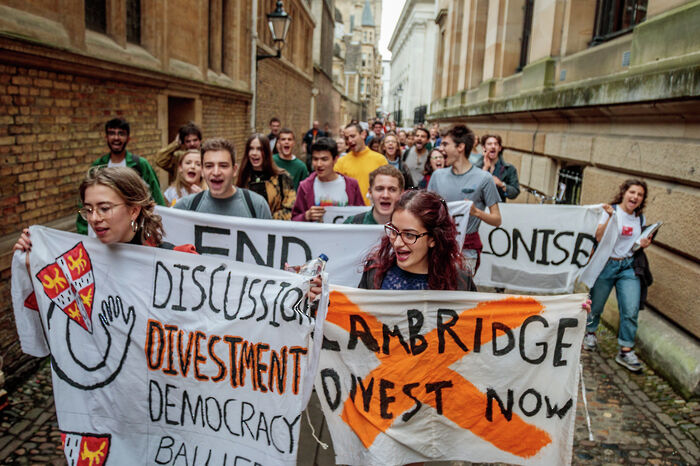Rethinking the politics of solidarity
Reflecting upon successful emancipatory protests throughout history, Ed McNally argues that Cambridge activists must locate their cause’s place in the wider world

Much contemporary student politics is defined by its insularity and fragmentation, absorbed by the campus itself, and focused on struggles conceived as singular and separate. Partly because of this, left-wing organising on campus is often bereft of any comprehensive or coherent practice of solidarity. This has not always been the case, and as calls to decolonise universities gain currency, we can learn much from thinking about the history of anti-imperial and anti-colonial struggles of the last century. Here we find commitment to a kind of solidarity—universalising, unifying—worth remembering, and worth reviving.
Student politics at its best and most vibrant has always faced the world, attuned to and in concert with transnational fights for freedom. Recalling his time as a student in London in 1945, the great Ghanaian anti-colonial revolutionary Kwame Nkrumah later wrote of being inspired by “experiencing first hand the determination of student bodies fighting and agitating for colonial freedom in the very heart of a country that possessed a vast colonial empire”.
Student politics at its best and most vibrant has always faced the world
The Black Panther Party, founded in Oakland, California in 1966, rooted its revolutionary politics in a triangle of transnational solidarity and coalition building. At a time when the American state and its appendages were gunning down defenceless black citizens in cold blood, slaughtering hundreds of thousands in Vietnam, and drafting young Americans into the military, the Panthers built a coalition of the three. Solidarity here was understood not as ‘allyship’ or secondary support, but common struggle underwritten by universal opposition to empire and particular struggle against its American iteration.
Students at US universities, composing the bulk of the anti-war movement and resistance to the draft, were an important part of this coalition. At Yale, thousands of (pre-dominantly white) students responded to the Party’s call for solidarity and staged a major strike in April 1970, the first in their history, agitating for the release of Bobby Seale and other Panther political prisoners. They pushed the university administration into public questioning of state repression of the Panthers, and catalysed a national student strike in which more than four million took part across hundreds of college campuses.
Huey argued that these white, bourgeois students facing the draft were oppressed in a “somewhat abstract” way, immune as they were from class exploitation and racism. Perhaps they weren’t oppressed at all. Nevertheless, he thought that the place of the students in the Panther-led anti-imperialist coalition could be made concrete by the act of them “choosing their friends.” He continued: “they have a choice between whether they will be a friend of Lyndon Baines or a friend of Fidel Castro. A friend of Robert Kennedy or a friend of Ho Chi Minh. And these are direct opposites. A friend of mine or a friend of Johnson’s.”
This idea of solidarity and the coalitions that came of it were forged in the heat of an assertive age of global anti-colonial insurgency, and might thus seem rather alien to our contemporary student political landscape. But though conditions have changed, there is much to be learned from this (largely lost) spirit of solidarity. In a world still ridden with injustices and with oppressed peoples still facing down imperial power, the imperative for students in a place like Cambridge to choose their friends endures.
The imperative for students in a place like Cambridge to choose their friends endures
What does this mean in practice for students today? Too much organising on campus fails to look beyond the immediate purview of its activists, and becomes consumed with totally transforming its own political spaces before seriously orienting itself to the world. Facing the world and choosing our friends—standing with the oppressed from Palestine to Kurdistan and Standing Rock—should instead be the starting point. Then comes the work of coalition building, of common struggle and service.
Building this kind of material solidarity is imperative for all who care for the cause of human freedom, but is a particular duty for those of us within institutions like Cambridge, whose historic and ongoing complicity in the reproduction of oppressive power structures implicates us all. Much of the work to extricate our institution from this position is already underway here: fossil fuel divestment activists have worked with indigenous communities who are fighting on the frontline against climate change, whilst Palestine solidarity campaigners work stand alongside, and take lead from, Palestinian civil society.
Underlying all this is the simplest of ideas: that ‘our’ freedom is inextricably bound up with that of others. It was this that led the great Labour politician Tony Benn to insist that “injustice to anybody anywhere is a matter of concern to everybody everywhere”, and to Nelson Mandela’s declaration after the fall of South African apartheid that “our freedom is incomplete without the freedom of the Palestinians.”
The best historic traditions of emancipatory politics teach us that particular struggles are inseparable from universal causes, and vice versa. In seeking to build a better world and subvert the stature of elite universities towards the end of social good, student activists of all stripes in Cambridge and beyond would do well to remember this.
 Arts / Plays and playing truant: Stephen Fry’s Cambridge25 April 2025
Arts / Plays and playing truant: Stephen Fry’s Cambridge25 April 2025 News / Candidates clash over Chancellorship25 April 2025
News / Candidates clash over Chancellorship25 April 2025 Music / The pipes are calling: the life of a Cambridge Organ Scholar25 April 2025
Music / The pipes are calling: the life of a Cambridge Organ Scholar25 April 2025 Comment / Cambridge builds up the housing crisis25 April 2025
Comment / Cambridge builds up the housing crisis25 April 2025 News / Cambridge Union to host Charlie Kirk and Katie Price28 April 2025
News / Cambridge Union to host Charlie Kirk and Katie Price28 April 2025





